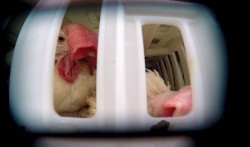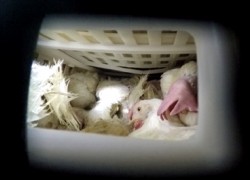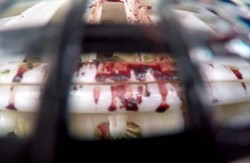 Tonight while conducting random inspections, we spotted 2 poultry trucks parked beside an egg farm in Dreumel, the Netherlands. We want to check on the welfare of the birds during catching and loading and ask the farmer for permission to enter, which he accepts. The spent-hens are caught manually by a chicken-catching crew. 3-4 hens at a time are grabbed by their legs and then hang upside down. They are then stuffed into the top-doors of transport crates. The transport crates used were at least ones with large sliding doors, which is positive compared to those with just small openings that risk more injury to the birds. The crates are then stacked up and rolled out towards the truck. A forklift was used to then lift the stacked crates onto the truck. The handling of the loaded crates was at times very rough. One worker shook a loaded crate abruptly and another crate, fully loaded with hens, fell off the stack and landed on the ground 2 metres below. The trucks are both from the company Lechdrob, which is a large hen slaughterhouse in Zalewo (northern Poland).
Tonight while conducting random inspections, we spotted 2 poultry trucks parked beside an egg farm in Dreumel, the Netherlands. We want to check on the welfare of the birds during catching and loading and ask the farmer for permission to enter, which he accepts. The spent-hens are caught manually by a chicken-catching crew. 3-4 hens at a time are grabbed by their legs and then hang upside down. They are then stuffed into the top-doors of transport crates. The transport crates used were at least ones with large sliding doors, which is positive compared to those with just small openings that risk more injury to the birds. The crates are then stacked up and rolled out towards the truck. A forklift was used to then lift the stacked crates onto the truck. The handling of the loaded crates was at times very rough. One worker shook a loaded crate abruptly and another crate, fully loaded with hens, fell off the stack and landed on the ground 2 metres below. The trucks are both from the company Lechdrob, which is a large hen slaughterhouse in Zalewo (northern Poland).
We decide to trail the trucks to their destination in Zalewo. The journey lasted 16,5 hours. The drivers had a few short stops along the way. During these short breaks, we check on the birds. We see blood dripping on both sides of one truck and on one side of the other truck. The blood is due to crushed toes of the birds, caught in between the stacked crates, and possibly from a crushed wing. The loading density varies from crate to crate, but in general it is very high. The birds cannot stand up. In each crate there is one water nipple on the side, but it is impossible for all the birds inside the crate to walk over and reach it.
This investigation will be used by the Dierenbescherming in their media-campaign. We will use it as a tool to convince chicken-catching crews to sign up for our training course in more ethical methods of chicken catching. Our aim is that the organic egg label take into account also the welfare of the hens during catching and loading, whereby hens are caught and loaded upright and with patience. Consumers of organic eggs will need to pay a bit extra but in exchange help create not only a better life for the hens on the egg farms but also reduce suffering during catching.
Watch the inspection footage HERE.



